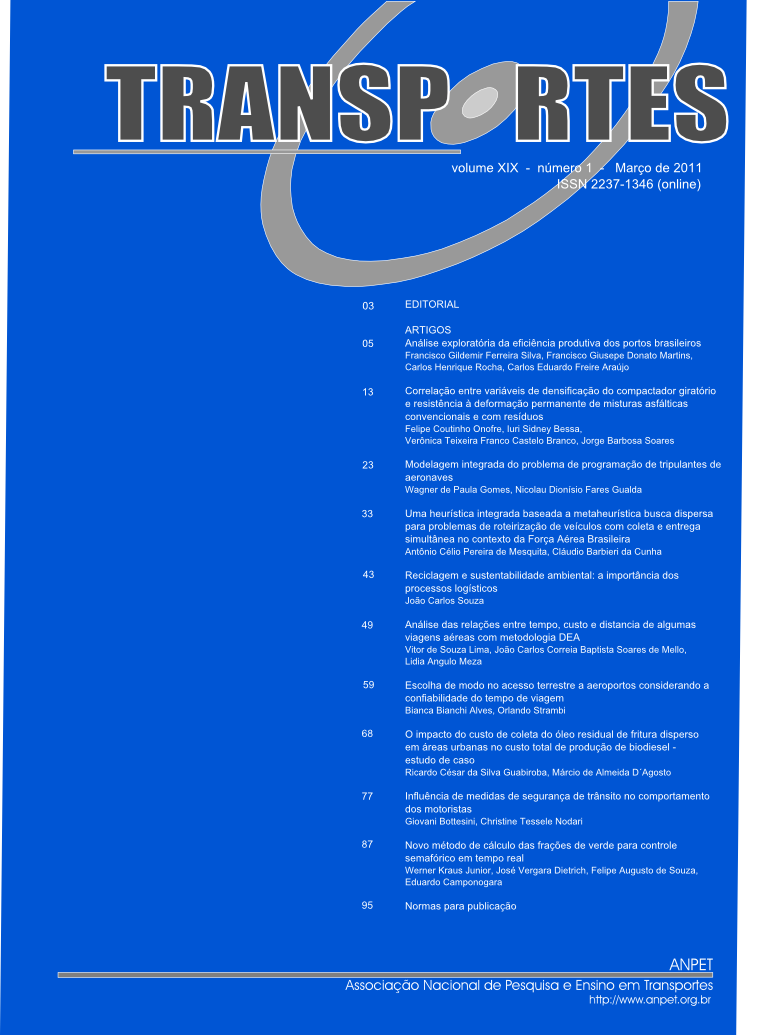Reciclagem e sustentabilidade ambiental: a importância dos processos logísticos
DOI:
https://doi.org/10.14295/transportes.v19i1.484Abstract
Resumo: Cresce a consciência que os recursos do planeta são finitos e, caso não se tomem providências para o controle da poluição e do aquecimento global, é possível que em longo prazo a vida na terra se torne inviável. Em função deste fato, surge nos meios acadêmicos um grande interesse em torno da “Logística para Reciclagem”, que pode ser definida como: O processo de planejamento, implementação e controle da eficiência e eficácia e dos custos, dos fluxos de matérias-primas, produtos em estoque, produtos acabados e informação relacionada, desde o ponto de consumo até um ponto de reprocessamento, com o objetivo de recapturar valor ou realizar a deposição adequada. O modelo proposto neste trabalho tem por objetivo destacar a importância dos processos logísticos para que as atividades de reciclagem de materiais sejam eficientes e ajudem a garantir a sustentabilidade ambiental. Foi feita uma aplicação simulada para a região de Florianópolis e municípios adjacentes.
Palavras-chave: reciclagem; sustentabilidade ambiental; processos logísticos.
Abstract: The conscious that the resources of our planet are finite is growing up, and life on earth might be unviable, if the right providences are not taken. Due to this fact, a big interest about “Recycling Logistics” has arisen. Recycling Logistics, as well as reverse logistics, is traditionally defined as: The process of planning, implementing, and controlling the efficient, cost effective flow of raw materials, in-process inventory, finished goods and related information from the point of consumption to an reprocessing point for the purpose of recapturing value or proper disposal. The model proposed in this paper was applied in the region of Florianópolis and adjacent municipalities and aims to highlight the logistics for the activities of materials recycling and their importance to environmental sustainability.
Keywords: recycling; environmental sustainability; logistics processes.
Downloads
Downloads
Published
How to Cite
Issue
Section
License
Authors who submit papers for publication by TRANSPORTES agree to the following terms:
- The authors retain the copyright and grant Transportes the right of first publication of the manuscript, without any financial charge, and waive any other remuneration for its publication by ANPET.
- Upon publication by Transportes, the manuscript is automatically licensed under the Creative Commons License CC BY 4.0 license. This license permits the work to be shared with proper attribution to the authors and its original publication in this journal.
- Authors are authorized to enter into additional separate contracts for the non-exclusive distribution of the version of the manuscript published in this journal (e.g., publishing in an institutional repository or as a book chapter), with recognition of the initial publication in this journal, provided that such a contract does not imply an endorsement of the content of the manuscript or the new medium by ANPET.
- Authors are permitted and encouraged to publish and distribute their work online (e.g., in institutional repositories or on their personal websites) after the editorial process is complete. As Transportes provides open access to all published issues, authors are encouraged to use links to the DOI of their article in these cases.
- Authors guarantee that they have obtained the necessary authorization from their employers for the transfer of rights under this agreement, if these employers hold any copyright over the manuscript. Additionally, authors assume all responsibility for any copyright infringements by these employers, releasing ANPET and Transportes from any responsibility in this regard.
- Authors assume full responsibility for the content of the manuscript, including the necessary and appropriate authorizations for the disclosure of collected data and obtained results, releasing ANPET and Transportes from any responsibility in this regard.









